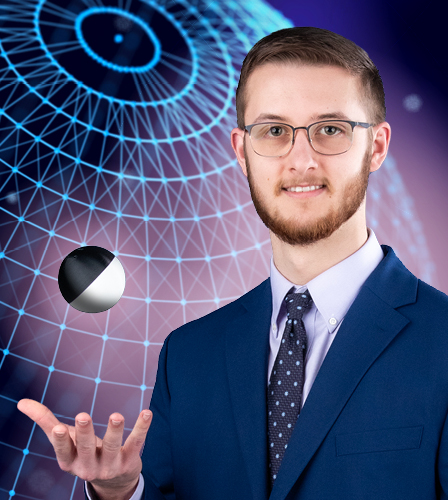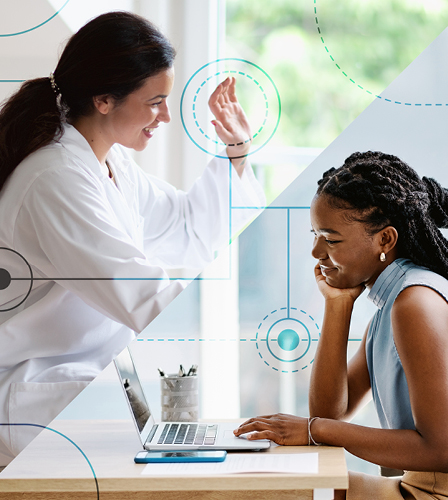Heat Mapping Motivation: USI's Biometrix Discovery Lab Reveals Secrets of Shoppers
Dogs are a customer’s best friend. That’s the discovery Ali Oliver ’14, Marketing Director at Midwestern Pet Foods, Inc.—an Evansville-based corporation that has eight different brands under its umbrella—and her marketing team made this past spring.
It’s no secret that people love dogs—from cute photos to countless viral videos, puppies have been known to provide happiness and comfort at times when it’s most needed. They can even make someone more inclined to buy a certain product. 
Oliver's team learned this when deciding on a new packaging design for the rebrand of their Earthborn Holistic line’s top-selling dog food. Using new technology provided by USI, they discovered bankable insights: people flocked to the bag with an image of a friendly pup and ignored nature scenes or landscapes. The pup provoked a positive emotional response detected by the eye-tracking glasses' heat sensor mapping and made the customer more likely to purchase the product. “They could not take their eyes off of this dog,” Oliver said. “We knew then that we might need to rethink this situation because this is what people look at—the dog. It helped make the decision for us.”
USI’s Biometrix Discovery Lab in the Romain College of Business, (funded by USI Foundation in 2017, and one of the only such labs housed in a business college) emphasizes research into human attention, arousal, cognition and emotion that is collected through eye-tracking glasses, screen-based eye-tracking software, facial expression analysis and electrodermal activity sensors.
“We apply biometric technology, some AI-driven, some not, to allow students, faculty and organizations in our community to discover insights into human behavior they otherwise may never uncover [through traditional methods, such as surveys],” said Dr. Chad Milewicz, Associate Professor of Marketing, Chair of
the Economics and Marketing Department and Director of the Biometrix Discovery Lab.
The technology used in the lab can detect the appeal of visuals using screen-based eye-tracking software and hardware to track the movement of the viewer’s eyes on a screen. This provides deeper insights into how placement of images and content in videos, websites, games, 3D environments and more hold the attention of people. In the field, similar data is gathered through eye-tracking glasses that record what people look at and for how long in stores and businesses.
Faces are telling as well, and the lab’s facial expression analysis captures emotional expressions and automated facial coding from any video to test the impact of content intended to elicit emotional arousal and facial response. But sometimes it takes more than just facial recognition to see how someone reacts to something—the lab can also measure emotional response through electrodermal activity. If something is scary, threatening, joyful or otherwise emotionally relevant, then there is an increase in eccrine sweat gland activity that can be detected.
“To really understand human behavior, you have to go much deeper than what surveys or questionnaires can reveal and analyze people’s emotional, physiological and cognitive responses. Tapping into the nonconscious allows us to see the driving forces and factors behind behavior and decision making,” said Peter Hartzbech, Chief Executive Officer of iMotions, the company that developed the technology used in USI's lab.
 Implementing biometric research into the academic sphere opened the door to many opportunities for both faculty and students. “Many industries, including advertising, healthcare and automotive, are applying emotional AI—a capability which we have in our lab,” Milewicz said. “Affectiva, the company which supplies our emotion AI software, reports that 70% of the world’s largest advertisers and 28% of Fortune Global 500 companies use emotional AI. We are constantly looking for ways to apply this and our other biometric technologies for academic research and to provide consulting to regional businesses.”
Implementing biometric research into the academic sphere opened the door to many opportunities for both faculty and students. “Many industries, including advertising, healthcare and automotive, are applying emotional AI—a capability which we have in our lab,” Milewicz said. “Affectiva, the company which supplies our emotion AI software, reports that 70% of the world’s largest advertisers and 28% of Fortune Global 500 companies use emotional AI. We are constantly looking for ways to apply this and our other biometric technologies for academic research and to provide consulting to regional businesses.”
It is not only industries who can benefit from USI’s Biometrix Discovery Lab. USI’s marketing students have already placed USI on the map with their wins when Jaeden O’Dell-Schultz '23 and Courtney Bourne '23 placed second at the American Marketing Association International Collegiate Conference in the international Undergraduate Research Competition held in New Orleans last spring. They defeated students from universities such as Arizona State, University of Florida, University of Kentucky and Penn State with their research presentation focused on the application of neuroscientific techniques, such as eye-tracking, to learn about students’ emotional responses and visual attention when viewing different social media accounts.
“Applying my marketing knowledge to a unique project provided insight into the daily responsibilities of professional marketers,” said O’Dell-Schultz. “Overall, this experience was amazing and helped me gain a better understanding of my future profession.”
Students, in turn, are bringing benefits to the state through a collaboration with the Indiana Commission for Higher Education. Dr. Sabinah Wanjugu, Assistant Professor of Marketing, and her junior marketing students audited the Commission’s website, Learn More Indiana, to improve its optimization and marketability for their audience of high school students, counselors and parents.
“[The resources in this lab] have bridged the gap between academia and industry, offering valuable experiential learning opportunities and elevating the quality of research conducted by students and faculty,” said Wanjugu. “As a marketing faculty member, I believe that research conducted through the lab will lead to the discovery of valuable insights and impactful research findings, ultimately enhancing the institution's reputation and contributing to the advancement of marketing knowledge.”
In addition to Midwestern Pet Foods, the Biometrix Discovery Lab has also worked with Berry Global’s Blue Clover Studios for design purposes and is currently talking with The Children’s Museum of Indianapolis about a partnership on a wayfinding study—an opportunity Milewicz noted would be “exciting to work with the largest children’s museum in the country.”
Not only do these partnerships open the door for faculty to do new research studies but they also open up the possibility of presenting research at various conferences related to biometrics. It also has allowed the lab to expand its footprint outside of the Evansville area into more of a regional and, ideally in the near future, a nationally known facility. “These partnerships benefit both the College and those who work with the lab in several ways,” said Dr. Nicolas Jankuhn, Assistant Professor of Marketing. “These collaborations create a mutually beneficial relationship that supports the growth and development of both the College and its students, while also contributing to the local community.”
 Currently, the Biometrix Discovery Lab is mostly used by the Romain College of Business faculty. But soon, that will be changing. Thanks to a presentation by Jankuhn and Wanjugu at USI’s Teaching and Learning Symposium, instructors across campus have become interested to see how they can use the eye-tracking glasses and software in their various disciplines.
Currently, the Biometrix Discovery Lab is mostly used by the Romain College of Business faculty. But soon, that will be changing. Thanks to a presentation by Jankuhn and Wanjugu at USI’s Teaching and Learning Symposium, instructors across campus have become interested to see how they can use the eye-tracking glasses and software in their various disciplines.
Sophia Okotah, Assistant Professor of Art and Design in the College of Liberal Arts, is in the beginning stages of using eye-tracking software in her classes. With the help of this technology, students will learn how to improve the user experience of whatever they create and how they can best attract their target audience.
“There is nothing more satisfying and rewarding than when designers decipher the emotions their work exudes in users and learn about the parts of a visual piece that matter the most to them,” Okotah said. “With this tool, designers, marketers and clients are more inclined to successfully reach project goals, and I am glad that story begins here at USI.”
In addition to cross-campus collaboration, the lab is continuing to look for more partnerships with companies near and far. There also will be opportunities to add more technology and hardware, as there continues to be advances in both artificial intelligence and beyond.
Whether it’s discovering the best way to market dog food or mapping out the best route for a museum, biometric research provides a deeper look into decision-making that we haven’t had access to before.
New lessons will be learned, fresh insights gained. As long as biometric research is consistently pursued, there will always be discoveries to be made.
“The technology is incredible,” Milewicz said. “But it is human creativity and the desire of students, educators, researchers and community partners to explore and to discover that will allow the lab to grow and have a positive impact at USI and beyond.”
In addition to the Biometrix Discovery Lab, the Romain College of Business is also home to the Experimental Economics Lab, Cybersecurity Operations Center and Textual Analytics and Publications Laboratory (TAPLab). Dr. Sudesh Mujumdar, Dean of the Romain College of Business, believes these facilities help prepare students for real-world experiences in their respective fields.
“I’ll be hard pressed to come up with a business school that has all four labs of this sort residing in the business school. That’s sort of unique,” Mujumdar said. “Our students have access to these labs and are co-creating experiences with faculty members and businesses in the community. That’s what makes us special.”
Author Bio:
Hendrix Magley is the Content Marketing Specialist in the Romain College of Business at the University of Southern Indiana. Prior to his time at USI, Hendrix was a sports journalist and spent time at the Evansville Courier & Press and Dubois County Herald. In his free time, he enjoys collecting football cards and making throwback music playlists.






